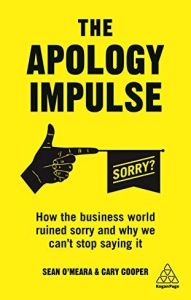Join getAbstract to access the summary!

Join getAbstract to access the summary!
Cary Cooper and Sean O'Meara
The Apology Impulse
How the Business World Ruined Sorry and Why We Can't Stop Saying It
Kogan Page, 2019
What's inside?
Businesses and leaders apologize more than in the past – but they’re not actually saying they’re sorry.
Recommendation
Businesses and individuals make a lot more apologies than they did in the past. They might apologize, but often they do not actually say they’re sorry. Squeezed between demands from consumers for greater accountability and fear of litigation, businesses leaders view the act of making an apology with trepidation. Consultant Sean O’Meara and academician Cary Cooper explain how to apologize properly and offer a fascinating analysis of the factors that influence the practice of making apologies, with or – more often – without contrition.
Summary
About the Authors
Sean O’Meara set up the public relations and digital communication consultancy Essential Content. Cary Cooper is the 50th Anniversary Professor of Organizational Psychology and Health at Alliance Manchester Business School of the University of Manchester. They are also the co-authors of Detox Your Desk.

















Comment on this summary